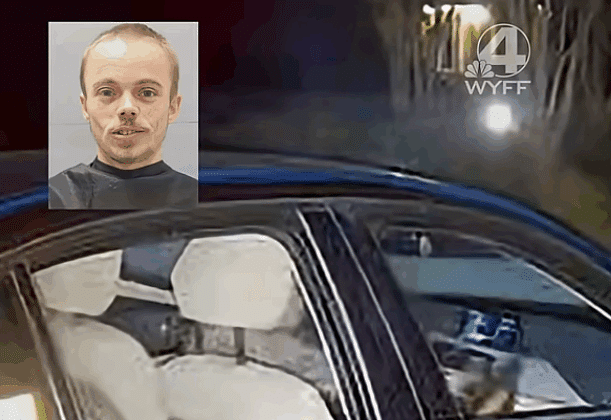Black Man Shot at While Waiting for Work Highlights South Carolina’s Lack of Hate Crime Law

Jarvis McKenzie was simply waiting for his work ride at 5:30 a.m. on July 24 when a white man fired a rifle over his head and yelled “you better get running, boy!” The shooting has renewed calls for South Carolina to join 48 other states in passing hate crime legislation, as the state remains one of only two without such laws.
The Incident and Its Aftermath
McKenzie, who had waited at the same spot in his Richland County neighborhood for a year without incident, describes the terror of that morning when he locked eyes with the shooter and saw unmistakable hatred. Security camera footage captured the white man grabbing his rifle and firing through his car window before driving away.
“It’s heartbreaking to know that I get up every morning. I stand there not knowing if he had seen me before,” McKenzie said. The incident has left him constantly looking over his shoulder, feeling watched and followed whenever he ventures outside.
The shooter faces charges of assault and battery of a high and aggravated nature, carrying up to 20 years in prison if convicted. He also became the first person charged under Richland County’s local hate crime ordinance, though that misdemeanor charge carries a maximum penalty of only one month in jail.
Local Response to State Inaction
McKenzie’s case illustrates why approximately two dozen South Carolina local governments have passed their own hate crime ordinances in recent years. These local measures represent the latest attempt to pressure the state legislature, particularly the Senate, to act on comprehensive hate crime legislation.
Richland County Sheriff Leon Lott, who advocated for his county’s ordinance, argues the issue is straightforward: “It’s common sense. We’re making something very simple complicated, and it’s not complicated. If you commit a crime against somebody just because of the hate for them, because of who they are, the religion, etcetera, we know what that is.”
However, local ordinances face significant limitations. Restricted to misdemeanor penalties with maximum sentences of 30 days, they lack the enhanced sentencing power of proposed state legislation, which could add years to convictions for violent crimes motivated by bias.
Decade of Legislative Stalemate
South Carolina’s resistance to hate crime legislation became particularly prominent after the 2015 racist massacre at Emanuel AME Church in Charleston, where nine Black worshippers were killed. Despite pressure from businesses, survivors, and some Republican legislators, the Senate has repeatedly stalled proposed legislation.
The South Carolina House passed hate crime legislation in 2021, but Senate leadership has prevented floor votes in both 2021 and 2023 sessions. Supporters argue that moderate Republicans would join Democrats to pass the measure, but procedural maneuvers keep it buried on the Senate calendar.
Republican Senate Majority Leader Shane Massey explained his opposition during a 2023 floor debate: “The problem right now is there is a number of people who think that not only is it feel good legislation, but it is bad legislation. It is bad policy not because people support hate but because it furthers division.”
Federal vs. State Jurisdiction Debate
Opponents frequently cite existing federal hate crime laws as sufficient protection. The Charleston church shooter received a federal death sentence under such statutes, demonstrating their effectiveness in the most serious cases.
However, supporters argue federal jurisdiction has significant limitations. Federal officials cannot prosecute juvenile cases, have restricted resources compared to state prosecutors, and make prosecution decisions in Washington rather than at the local level where crimes occur.
This jurisdictional gap means many bias-motivated incidents may receive inadequate legal response, particularly those involving minors or cases that don’t meet federal prosecution thresholds.
Political Frustrations and Symbolic Messages
Democratic senators have expressed particular frustration that the legislature debates enhanced penalties for crimes against healthcare workers and police dogs while ignoring hate crimes. The disparity in priorities sends troubling signals about the state’s values and commitment to protecting vulnerable communities.
McKenzie’s attorney, Tyler Bailey, argues that South Carolina’s resistance emboldens white supremacists: “The subliminal message that says if you’re racist and you want to commit a crime and target somebody for their race, gender, ethnicity, sexual orientation or whatever it is you can do it here.”
Governor’s Position and Alternative Approach
Republican Governor Henry McMaster, while understanding local governments’ frustrations, opposes new hate crime legislation. The former prosecutor argues that existing assault and battery laws provide sufficient penalties, allowing judges to impose maximum sentences when bias motivation is evident.
“There’s no such thing as a love crime. There is always an element of hatred or disrespect or something like that,” McMaster said, expressing concern about investigating mental states and policing speech.
His position reflects broader conservative skepticism about hate crime laws, which critics argue create thought crimes and unequal justice systems based on victim characteristics.
Community Impact and Ongoing Trauma
For McKenzie, the political debates feel disconnected from his daily reality of fear and hypervigilance. Despite the serious felony charges his attacker faces, the absence of state hate crime recognition makes him feel that South Carolina doesn’t acknowledge the particular terror of racially motivated violence.
“I feel like somebody is watching me. I feel like I’m being followed,” McKenzie said. “It spooked me.”
His experience represents countless victims of bias-motivated crimes who seek not just punishment for their attackers, but recognition that crimes targeting people for their identity carry special significance and harm to entire communities.
The Path Forward
South Carolina’s status as one of only two states without hate crime laws increasingly isolates it from national consensus on bias-motivated violence. Wyoming remains the only other holdout, leaving South Carolina in uncomfortable company on civil rights issues.
The continuing local ordinance movement suggests grassroots pressure will persist despite Senate resistance. Whether this bottom-up approach can eventually overcome legislative inertia remains uncertain, but victims like McKenzie continue sharing their stories, hoping their experiences will finally move lawmakers to act.




